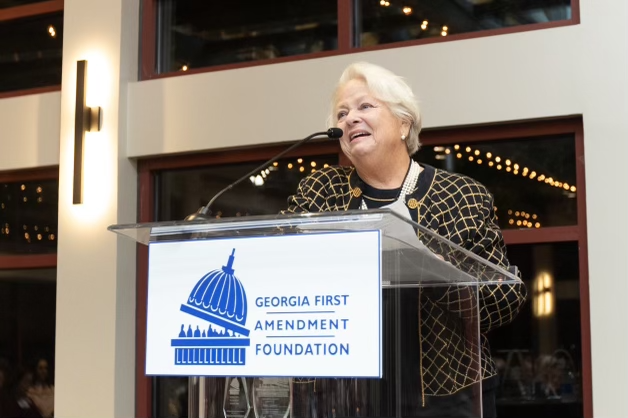Rep. Mary Margaret Oliver’s legislative seatmate from years ago, former Minority Leader DuBose Porter, delivered the speech to present her with The Georgia First Amendment Foundation’s 2023 Charles Weltner Freedom of Information Award on Thursday evening October 26.
The Foundation was established in 1994 and is a non-partisan, non-profit organization which works to educate citizens, public officials, journalists and lawyers on Georgia’s open records, open meetings and free speech laws. It is the state’s leading advocacy voice for government transparency, free speech rights, and access to public information, meetings and proceedings in the General Assembly, the courts and county and city offices across Georgia.
“Mary Margaret Oliver has for nearly 40 years set the bar for ethics, transparency and the support of open meetings and open records in Georgia by working to ensure that citizens have access to their own government,” Porter said. In addition to almost 30 years of legislative service, six of them as Minority leader, Porter served six years as chair of the Democratic Party of Georgia and is the Publisher of the Dublin Courier Herald and CEO for a group of 17 weekly newspapers which recently purchased the daily Albany Herald.
“Mary Margaret Oliver loves Georgia. All of it. From her cabin the mountains near Blue Ridge, which she has had even before Blue Ridge was cool, the coast and all in between,” Porter said, noting Mary Margaret grew up not far from the Emory Conference Center where the dinner was held. “Tonight, we are present in her briar patch. Her father was the pharmacist in Emory Village. This is her childhood, adolescent and adult stomping grounds.”
He said Rep. Oliver is one of the most thoughtful voices in addressing Georgia’s crisis in mental health. Further, she works tirelessly for the protection of children, the rights of women, marriage equality, voting rights and equal access to justice. “Mary Margaret Oliver has always been on the right side of history,” he said.
“What we are here to thank her for and celebrate tonight is her significant work and impact in open meetings, open records, ethics and transparency in Georgia,” Porter said, noting Rep. Oliver chaired the Judiciary Committee in both House and the Senate as the first woman to do so in each chamber. When not serving as chair, she has served on this important committee.
“Mary Margaret has been a steady, constant and unwavering voice for open meetings, open records and ethics and transparency. She has worked to bring sunshine to the conduct of public officials on how gifts, trips, business dealings and consulting relationships should be appropriately handled, with the point being that the public does have the right to know what its public officials do in office,” Porter said.
He noted Rep. Oliver proposed the most comprehensive ethics/ transparency legislation in state history which set the standard for what ethics laws in Georgia should, and therefore could, be. While that law was watered down, with her continuing legislative service she continues to push for improved ethics/ transparency laws and served as a strong advocate to prevent the erosion of current open meeting and open records laws.
“Over the past nearly 40 years, Mary Margaret Oliver really has been the one who has added and kept the sunshine in Georgia’s Sunshine Law,” Porter said.
He foreshadowed her later remarks in the wake of the Lewistown, Maine shooting by telling the appreciative audience one of Rep. Oliver’s proudest accomplishments “has nothing to do with why we are here tonight, but was instead when she received an “F” rating from the National Rifle Association.”
Rep. Oliver expressed deep gratitude for receiving an honor named for former Congressman and Georgia Supreme Court Chief Justice Charles L. Weltner. While serving in Congress, he was one of only two Southern members of Congress to condemn the 1963 16th Street Baptist Church bombing in Birmingham. He was also the only member of the Georgia Congressional delegation and the only Deep South Democrat to vote for the Civil Rights Act of 1964. In 1966, Weltner refused to run for re-election rather than sign a loyalty oath requiring him to support Lester Maddox, an ardent segregationist, saying he would “give up my office before I give up my principles” and would not “compromise with hate.”
Citing the legacy of Justice Weltner, Rep. Oliver asked the crowd to “lift a glass” in honor of two Georgians now dominating headlines. She called Fulton County District Attorney Fanni Willis “brave, brave, brave” and said she is an outstanding role model for the newer generation of women in politics – “She makes me happy every single day!” She also praised Federal District Court Judge Steve Jones and his 516-page order directing the General Assembly to draw new maps for Congressional and legislative maps. “This will make our election process more fair, and equitable, and more honest,” she noted. “We owe Judge Jones a debt of gratitude!”
As an homage to Justice Weltner, she quoted from a tribute Judge Thomas W. Thrash, Jr. wrote about Weltner which was and published in a Duke University Law School magazine: “I first met Charles Longstreet Weltner in 1978 when I was a young Assistant District Attorney assigned to his courtroom in the Superior Court of Fulton County, Georgia. I was two years out of law school. He was entering a new phase of his professional life after a political career that had soared to the mountaintop and then crashed to the valley below. I was a recent refugee from the world of corporate litigation, having the most fun of my life prosecuting crime. I had the great good fortune to appear before Judge Weltner in court on a daily basis; and to sit in his chambers and listen to him talk about the law, history, politics, and life in general. He could talk about anything. He was always interesting, often hilariously funny, and just a joyous person to be around,” Judge Thrash wrote.
Judge Thrash’s tribute shared a story from former Congressman Buddy Darden about a Congressional delegation touring the Royal Cathedral in Madrid, Spain. Justice Weltner delighted in translating aloud the Latin epitaphs of the medieval kings and queens entombed in the cathedral for his fellow travelers.
Rep. Oliver said she selected the theme of her remarks before the Lewiston, Maine mass shooting which included victims who had attended family night at a bowling alley. She posed two questions: “Why do we tolerate violence? And, what are the gaps in our leadership that we tolerate violence?”
As a young Legal Services attorney in rural Georgia, Rep. Oliver said she was “exposed to the real world of violence that many of my clients faced on a daily basis.” She recalled a client who was murdered by her former husband and the words of the Sheriff when she called to inquire: “You don’t represent her anymore lady. She’s dead.”
“People live with violence in their homes,” she said, noting violence becomes part of the public policy discussion when issues such as a law to hold stalkers accountable are discussed. As the primary sponsor of Georgia’s stalking law, Rep. Oliver said she heard many stories, including those from television personalities and fellow politicians, who had been stalked.
“Stalkers can be very dangerous. In today’s political world, where the threats of violence are far more extensive, far more detailed, and far more vicious, these conversations can be very troubling,” she said.
She gave high recommendations for a new book – American Gun: The True Story of the AR-15 – and the author Cameron McWhirter who was recently interviewed by Emory Professor Joe Crispino during a Carter Library book talk. The book outlined a how three United States senators reached a compromise of 10 years as the ”sunset provision” for the assault weapon ban passed in 1994 and not renewed in 2004.
“If they had not made that compromise; if the ban had been permanent, how many children from Sandy Hook and Uvalde who were murdered in massacres would be alive today?” she asked. “Compromise in the political world is very tough – very painful. We hear from the public that you want more compromise – that you just want people to work together. But, compromise is very tough particularly when the compromise is based on political give and take and not merits of the policy.”
She said earlier in her political career there were honest bi-partisan discussion about gun violence. “Today, gun violence has become a partisan issue – the worst and most dangerous partisan issue. In my view, there is no honest discussion. How many children would be alive today if the assault weapon ban had not ended?” she asked.
Ending her remarks on a positive note, she commended the work of current Georgia Supreme Court Chief Justice Mike Boggs who is working on the Behavioral Health Commission and bi-partisan efforts to reform Georgia’s mental health system. She called attention to the “staggering” numbers of times severely mentally ill people are arrested as they cycle between homeless encampments and jail cells where they receive no treatment.
She said Justice Boggs is forcing members of the General Assembly to look at real numbers and real budget figures, perhaps prompting “an area where we will see a little bit of agreement.” She expressed gratitude to Justice Boggs for his efforts and the legacy of Justice Weltner who cleared the path for leaders to tackle difficult subjects with integrity.
Circling back to Judge Steve Jones’ order which had been filed earlier in the day, she said the order also reflected Judge Weltner’s legacy.
“The court re-iterates that Georgia has made great strides since 1965 towards equality in voting. However, the evidence before this Court shows that Georgia has not reached the point where the political process has equal openness and equal opportunity for everyone,” she read from the concluding paragraph Judge Jones’ decision. “Accordingly, the Court issues this Order to ensure that Georgia continues to move toward equal openness and equal opportunity for everyone to participate in the electoral system.”



